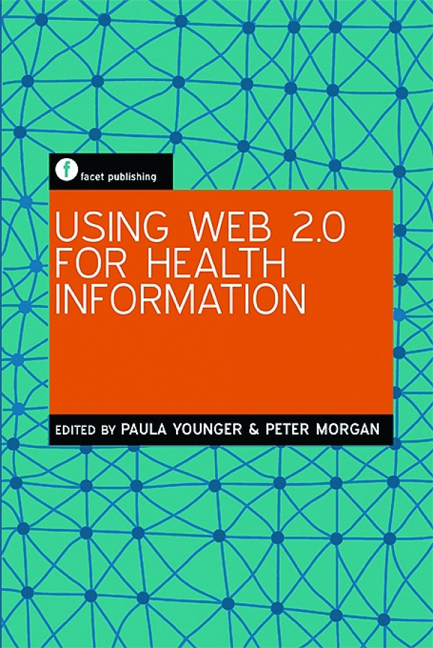Book contents
- Frontmatter
- Contents
- Preface
- Acknowledgements
- Contributors
- Glossary
- Introduction
- Part 1 The basics
- Part 2 Web 2.0 and the implications for health information
- 3 Emerging technologies in health, medical and nursing education
- 4 Supporting learners via Web 2.0
- 5 Supporting research
- 6 Crowdsourcing: the identification of content suitable for the developing world
- 7 Supporting patient needs: an overview of the potential role of Web 2.0 in patient and consumer information
- 8 Some ethical and legal considerations in the use of Web 2.0
- Part 3 Web applications in health information provision: some practical examples
- Part 4 The future
- Index
8 - Some ethical and legal considerations in the use of Web 2.0
from Part 2 - Web 2.0 and the implications for health information
Published online by Cambridge University Press: 08 June 2018
- Frontmatter
- Contents
- Preface
- Acknowledgements
- Contributors
- Glossary
- Introduction
- Part 1 The basics
- Part 2 Web 2.0 and the implications for health information
- 3 Emerging technologies in health, medical and nursing education
- 4 Supporting learners via Web 2.0
- 5 Supporting research
- 6 Crowdsourcing: the identification of content suitable for the developing world
- 7 Supporting patient needs: an overview of the potential role of Web 2.0 in patient and consumer information
- 8 Some ethical and legal considerations in the use of Web 2.0
- Part 3 Web applications in health information provision: some practical examples
- Part 4 The future
- Index
Summary
Introduction
Like all professionals, librarians and other information specialists are subject both to ethical standards that guide their professional conduct, and to legal regulation. It would be entirely wrong to suppose that the growth of the internet is solely responsible for determining the nature of the obligations and constraints to which professional behaviour is nowadays expected to conform. Many of these principles have been with us for far longer, establishing lasting social values and responsibilities that are fundamentally just as relevant now as they ever were. Issues such as copyright, defamation and negligence – and the need to be aware of them – were part of the fabric of professional life long before the internet arrived.
The new society of the internet
It is also true, however, that the internet's development has made a significant difference in at least two respects. First, it has accelerated the pace of technologydriven change, and in so doing has forced us to reconsider whether the existing ethical and legal framework is still adequate. When Charlie Chaplin (commenting on moral issues created by the emergence of atomic weapons) wrote ‘Man is an animal with primary instincts of survival. Consequently, his ingenuity has developed first and his soul afterwards. Thus the progress of science is far ahead of man's ethical behaviour’ (Chaplin, 1964, 507), he was drawing attention to the same relentless process of technological change and human response. Present-day examples can be seen in the public debates surrounding in vitro fertilization, genetic modification and stem-cell research. So it is inevitable that the all-pervasive growth of the internet's influence should be followed by a reassessment and redefinition of the standards we need to adopt in order to exploit it responsibly, and we need to be aware of how the results affect our professional activities.
This leads to the second difference, and one that perhaps uniquely defines the internet's character. Kevan and McGrath (2001) describe it thus: ‘The relationship between law and the internet is based upon a simple conflict: laws exist to regulate society; [but] the internet has created a new society founded upon the principle that it should be wholly unregulated.’ The consequences of that ‘simple conflict’ are in fact anything but simple, and contain further complexities that are relevant to us.
- Type
- Chapter
- Information
- Using Web 2.0 for Health Information , pp. 85 - 92Publisher: FacetPrint publication year: 2011



